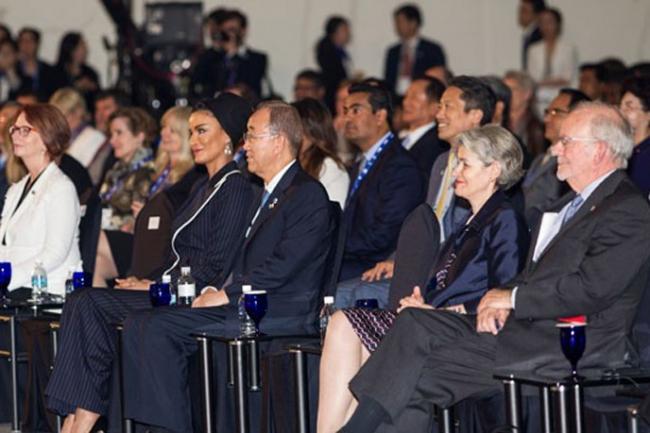22 May 2015, 03:29 pm Print

The Incheon Declaration, adopted at the World Education Forum, aims to underpin the education targets in the Sustainable Development Goals (SDGs) that will be adopted at the UN in September.
“This Declaration is a huge step forward,” said Irina Bokova, Director-General of the UN Educational, Scientific and Cultural Organization (UNESCO), in a joint press release with other UN agencies.
“It reflects our determination to ensure that all children and young people gain the knowledge and skills they need to live in dignity, to reach their potential and contribute to their societies as responsible global citizens,” she added.
She added, “It encourages governments to provide learning opportunities through life, so that people can continue to grow and develop. It affirms that education is the key to global peace and sustainable development.”
The Incheon Declaration builds on the global Education for All (EFA) movement that was initiated in Jomtien, Thailand in 1990 and reiterated in Dakar, Senegal in 2000. EFA – and the Millennium Development Goal on Education – resulted in significant progress, but many of its targets, including universal access to primary education, remain unfulfilled.
Currently, 58 million children remain out of school – most of them girls. In addition, 250 million children are not learning basic skills, even though half of them have spent at least four years in school. The Incheon Declaration seeks to finish the ambitious EFA and MDG agendas.
“If this generation of children is to someday reduce the inequalities and injustices that afflict the world today, we must give all our children a fair chance to learn.
The Incheon Declaration will be implemented through the Education 2030 Framework for Action, a roadmap for governments to be adopted by the end of the year.
Also on Thursday, the UN Special Rapporteur on education, Kishore Singh, called for strategies to address inequality by focusing on girls and women, ethnic minorities, persons with disabilities and children living in conflict-affected areas, rural areas and urban slums.
“It is the weakest among us who need education the most and we cannot stand by as they are being excluded,” he said in a news release.
“Governments must safeguard education as a public good, and urgently end the commercialization of education,” Singh added.
Singh called on governments to fully fund and implement their human rights obligations and bring free, public education for all. “Free basic education is the cornerstone of the right to education and must not be undermined through privatisation,” the Special Rapporteur said.
Photo: UNESCO
- US official reacts to Elon Musk's remarks backing India's permanent UNSC seat
- Sri Lanka: 6.2 magnitude earthquake hits Island Nation, no casualty
- UN chief hails SE Asia for vital role ‘building bridges of understanding’
- India-Uzbekistan Synergy at the SCO
- Kazakhstan to host Astana International Forum in June to address key global challenges






